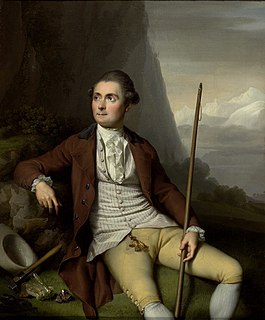A Quote by Blaise Pascal
We are only troubled by the fears which we, and not nature, give ourselves, for they add to the state in which we are the passions of the state in which we are not.
Related Quotes
The error of Socrates must be attributed to the false notion of unity from which he starts. Unity there should be, both of the family and of the state, but in some respects only. For there is a point at which a state may attain such a degree of unity as to be no longer a state, or at which, without actually ceasing to exist, it will become an inferior state, like harmony passing into unison, or rhythm which has been reduced to a single foot. The state, as I was saying, is a plurality which should be united and made into a community by education
The idea that the State is capable of solving social problems is now viewed with great skepticism - which foretells a coming change. As soon as skepticism is applied to the State, the State falls, since it fails at everything except increasing its power, and so can only survive on propaganda, which relies on unquestioning faith.
Man is the only animal who does not feel at home in nature, who can feel evicted from paradise, the only animal for whom his own existence is a problem that he has to solve and from which he cannot escape. He cannot go back to the prehuman state of harmony with nature, and he does not know where he will arrive if he goes forward. Man's existential contradiction results in a state of constant disequilibrium. This disequilibrium distinguishes him from the animal, which lives, as it were, in harmony with nature.
We have educated ourselves into a world from which wonder, and he fear and dread and splendor and freedom of wonder have been banished. Of course wonder is costly. You couldn't incorporate it into a modern state, beacuse it is the antithesis of the anxiously worshiped security which is what a modern state is asked to give. Wonder is marvellous but it is also cruel, cruel, cruel. It is undemocratic, discriminatory and pitiless.
If I am allowed to give a metaphorical allusion to the future state of the blessed, I should imagine it by the orange-grove in that sheltered glen on which the sun is now beginning to shine, and of which the trees are at the same time, loaded with sweet golden fruit and balmy silver flowers. Such objects may well portray a state in which hope and fruition become one eternal feeling.
The theory of the earth is the science which describes and explains changes that the terrestrial globe has undergone from its beginning until today, and which allows the prediction of those it shall undergo in the future. The only way to understand these changes and their causes is to study the present-day state of the globe in order to gradually reconstruct its earlier stages, and to develop probable hypotheses on its future state. Therefore, the present state of the earth is the only solid base on which the theory can rely.
The State is the curse of the individual... The State must go! That will be a revolution which will find me on its side. Undermine the idea of the State, set up in its place spontaneous action, and the idea that spiritual relationship is the only thing that makes for unity, and you will start the elements of a liberty which will be something worth possessing.
All the worth which the human being possesses all spiritual reality, he possesses only through the State... For Truth is the Unity of the universal and subjective Will; and the Universal is to be found in the State, in its laws, its universal and rational arrangements. The State is the Divine Idea as it exists on Earth. We have in it, therefore, the object of History in a more definite shape than before; that in which Freedom obtains objectivity...
I please myself with imagining a State at least which can afford to be just to all men, and to treat the individual with respect as a neighbor; which even would not think it inconsistent with its own repose if a few were to live aloof from it, not meddling with it, nor embraced by it, who fulfilled all the duties of neighbors and fellow-men. A State which bore this kind of fruit, and suffered it to drop off as fast as it ripened, would prepare the way for a still more perfect and glorious State, which also I have imagined, but not yet anywhere seen.
Under a government which imprisons any unjustly, the true place for a just man is also in prison, the only house in a slave State in which a free man can abide with honor. They do not know how much truth is stronger than error, nor how much more eloquently and effectively he can combat injustice who has experienced a little in his own person. If the alternative is to keep all just men in prison, or give up war and slavery, the State will not hesitate which to choose.
I'm not in sympathy with Communism except for populations which are in a state of peasantry, actually hungry and starving. The ideal state for me is some form of Socialism, which doesn't yet exist, as far as I know, which doesn't repress the arts, or any race. Consequently I'm not a political person ... except that I'm a revolutionary.







































